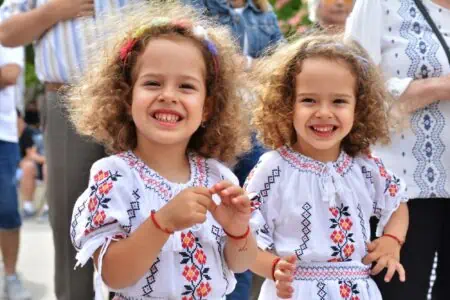Polish girl names can vary from traditional and historical to the unusual and enchanting. Polish names for girls can use different versions of the same root name, which might be confusing when deciding which name best suits the baby girl you’re expecting.
Our helpful list will break down Polish female names into their vast history, multiple meanings, and even some famous Polish women who have used these names. Have fun unearthing these awesome names for the little Polish-inspired princess in your life.
105 Beautiful Polish Names for Girls
Climb into the magical realm of enchanting Polish female names and watch your little girl shine.
Ada
Ada is a pretty Polish variation with Germanic roots or names like Adelaide and Adeline. Ada means “nobility” in German and “adornment” in Hebrew, so it may please your little girl’s fancy to be called Ada for her charmed life.
- Origin: Polish, Germanic, Hebrew
- Meaning: Noble, happy
- Pronunciation: AA-Daa
- Variations: Addie, Adel, Aida, Adiah, Adina
- Namesakes: Ada Sari, a Polish opera singer, actress, and educator. Ada Gabrielyan, an Armenian art teacher and painter.
- Popularity: Ada is the 2,204th most popular name worldwide, with the most usage in Nigeria and the U.S.
Adelajda
Adelajda is the Polish spelling of the German Adalheidis, meaning “noble natured.” This stereotypical vintage name is quite rare these days, but Adelajda may sound like the perfect good-natured name for the baby girl you’re expecting.
- Origin: Polish
- Meaning: Noble
- Pronunciation: Aa-Deh-LEYD-ah
- Variations: Adelaide, Adelheid
- Popularity: In 2014, 1,146 people were named Adelajda worldwide, with the most occurrences in Albania and Poland.
Agata
Agata is a Polish variation of the ancient Greek “Agathe,” meaning “one who is being good.” Agata is typical in Poland and mildly used elsewhere. Your little girl could benefit from old and traditional Polish female names such as Agata.
- Origin: Polish, Greek
- Meaning: Being good
- Pronunciation: AA-gaa-Taa
- Variations: Agatha, Agota, Agotha, Agate,
- Namesakes: Agata Bronisława Buzek, a Polish actress who won the Polish Academy Award for Best Supporting Actress in 2003. Agata Pyzi, a Polish journalist and cultural critic whose work has appeared in The Wire and The Guardian.
- Popularity: Agata is the 3,017th most popular name worldwide and ranked 37th in Poland.
Agnieszka
Agnieszka is the Polish version of Agnes, derived from the ancient Greek “hagnos,” meaning “pure or chaste,” and “agnus,” meaning “lamb.” Your little lamb will love this gentle, feminine name.
- Origin: Polish, Greek, Latin
- Meaning: Chaste, sacred
- Pronunciation: Ao-Ngniy-EHSH-Kaa
- Variations: Agnieska, Agnes
- Namesakes: Agnieszka Duczmal, a Polish conductor and founder of the Poznań Amadeus Orchestra. Agnieszka Bednarek-Kasza, a Polish volleyball player and bronze medalist of the European Championship in 2009.
- Popularity: Agnieszka is the 1,109th most common name worldwide and ranked 7th in Poland.
Albina
Albina is the Polish descendent of the ancient Roman surname Albinus, which arose from the Latin “albus,” meaning “white” or “bright.” Albina was more typically used in the Middle Ages, but it may find favor with your special little girl too.
- Origin: Polish, Latin
- Meaning: White, bright
- Pronunciation: AaL-BIY-Naa
- Variations: Albeana, Albeanah, Albeena, Albeina, Albiena, Albinah, Albyna
- Namesakes: Albina Grčić (known as Albina), a Croatian singer representing Croatia in the 2021 Eurovision Song Contest. Albina Lucy Charlotte Osipowich, an American swimmer who won gold medals at the 1928 Summer Olympics.
- Popularity: Albina is the 2,308th most popular name worldwide and is most prevalent in Russia.
Aldona
Aldona is the Polish variation of the Belarusian Aldonia, meaning “wiser.” Aldona is also used in Lithuania but is considered unique elsewhere. Whether your little girl is the elder or younger, Aldona may make a mighty name for her to enjoy.
- Origin: Polish, Slavic
- Meaning: Elder, noble, older
- Pronunciation: Aal-DUW-Naa
- Variations: Alda
- Namesakes: Aldona, Queen consort of Poland from 1333–1339 and Princess of the Grand Duchy of Lithuania. Aldona Zofia Wos, the Polish-American U.S. Ambassador to Estonia from 2004-2006,
- Popularity: Aldona is the 13,563rd most popular name worldwide and ranked 7th in Lithuania.
Aleksandra
Aleksandra is the Polish variation of the ancient Greek Alexander/Alexandra, used to describe the goddess Hera. This noble name can show off the best qualities of your sweet girl.
- Origin: Polish, Greek
- Meaning: Defender or helper of mankind
- Pronunciation: Aal-ehk-SAAN-Draa
- Variations: Alexandra, Alyxandra, Alessandra, Alexandria
- Namesakes: Aleksandra Kurzak, a Polish operatic soprano singer. Aleksandra Crapanzano, a screenwriter, food writer, and recipient of The M.F.K. Fisher Award for Distinguished Writing from The James Beard Foundation.
- Popularity: Aleksandra is the 423rd most common name worldwide, with the most usage in Russia.
Alfreda
Alfreda is made up of the root words “aelf,” meaning “elf” and “raed,” meaning “counsel, advice.” Your little elf girl will steal the show anywhere she goes with this cool, magical name.
- Origin: Polish, Germanic, English
- Meaning: Inspired advice, old peace
- Pronunciation: AaL-FREH-Daa
- Variations: Alfredda, Alfreeda, Alfreida, Alfrida, Alfrieda
- Namesakes: Alfreda Frances Bikowsky, an American CIA officer who headed the Bin Laden Issue Station and the Global Jihad unit. Alfreda Noncia Markowska, a Polish-Romani woman who saved approximately fifty Jewish and Roma children during World War II.
- Popularity: Alfreda is the 25,511th most common name worldwide, with the most usage in the U.S.
Alicja
Alicja is a Polish version of Alice or Alicia, with German roots. Alicja’s meanings all connote nobility and have been given to ladies with their nobility to share, just like your baby girl will have.
- Origin: Polish, Germanic
- Meaning: Noble-natured, noble person
- Pronunciation: Aa-LIY-Zyaa
- Variations: Alicia, Alice, Ala, Alinka
- Namesakes: Alicja Rosolska, a Polish tennis player who ranked 636th in 2003. Alicja Trout, an American rock guitarist, singer, and songwriter best known for the synth-heavy band Lost Sounds.
- Popularity: Alicja is the 7,723rd most common name worldwide and ranked 73rd in Poland.
Amelia
Amelia is used globally, including in Poland, and comes from the Latin “Aemilia,” from “aemulus,” meaning “imitating or rivaling.” There should be no rivals for the baby girl you’re expecting when she’s named Amelia.
- Origin: Polish, Germanic, Latin
- Meaning: Work
- Pronunciation: Aa-MEH-liy-Aah
- Variations: Aemilia, Amalia, Amalie, Ameila, Amilia, Amylia
- Namesakes: Amelia Lily Oliver, an English singer and television personality. Amelia B. Coppuck Welby, an American 19th-century fugitive poet.
- Popularity: Amelia is the 1,427th most popular name worldwide, with the most occurrences in Mexico and Brazil.
Aneta
Aneta is a Polish and Slavic diminutive of Anna, which hails from the ancient Hebrew for “grace,” “favor,” and “merciful.” Aneta is primarily used in Poland and the Czech Republic, but your little girl can also show all her grace by being called Aneta.
- Origin: Polish, Slavic, Hebrew
- Meaning: Favored by God
- Pronunciation: Ah-NEHT-Ah
- Variations: Anita, Annette
- Namesakes: Aneta Beata Kręglicka, a Polish dancer and beauty queen, crowned Miss World in 1989. Aneta Lemiesz, a Polish runner, specializing in the 400 and 800 meters.
- Popularity: Aneta is the 4,477th most common name worldwide and ranked 58th in Poland.
Aniela
Aniela is a Polish variation of the Hebrew Anne and the Greek Angela, leading to the meaning “angel.” Aniela is top-notch for Polish girl names that will make your little angel feel like the most beautiful divine princess around.
- Origin: Polish, Greek, Hebrew
- Meaning: Angel
- Pronunciation: Ahn-IYEH-Lah
- Variations: Annie, Anka
- Namesakes: Aniela Jaffé, a Swiss analyst and co-worker of Carl Jung. Aniela Zagórska, a Polish translator of almost all Joseph Conrad’s works.
- Popularity: In 2014, 6,492 people were named Aniela worldwide, ranking 550th in Poland.
Anna
While Anna is the second most popular name in Poland, it is hugely common worldwide. Anna comes from the Hebrew Anna, and has stayed with us through the years. Naming the first Anna in your family may be a wonderful concept!
- Origin: Polish, Greek, Hebrew
- Meaning: Grace
- Pronunciation: AAN-naa
- Variations: Ann, Anne, Ana, Anja, Anya
- Namesakes: Dame Anna Wintour, a British-American journalist, Editor-in-Chief of Vogue, and Global Chief Content Officer for Condé Nast. Anna Pavlovna Pavlova, a Russian prima ballerina of the late 19th and early 20th-centuries.
- Popularity: Anna is the 20th most common name worldwide and ranked 1st in Sweden and 2nd in Poland.
Antonina
Antonina comes from the ancient Roman surname Antonius, which morphed into Antoninus. Antonina is a gorgeous name for women and a unique name encouraging her to grow into a mature lady.
- Origin: Polish, Latin
- Meaning: Priceless
- Pronunciation: Aan-tao-NIY-Naa
- Variations: Antonia, Antonine, Antionette
- Namesakes: Antonina Aleksandrovna Kymytval, a Chukchi poet and children’s writer. Antonina Krzysztoń, a Polish singer-songwriter awarded the Officer’s Cross of the Order of Polonia Restituta.
- Popularity: Antonina is the 3,361st most popular name worldwide, with the most usage in Russia.
Asia
Asia is a Polish diminutive of Joanna, yet has a beauty all its own. Asia emanates from the Arabic “asu,” meaning “to rise, east.” Asia is the best name to give a little girl whose smile is as pretty as an Eastern sunrise.
- Origin: Polish, Hebrew, Arabic
- Meaning: To rise, east
- Pronunciation: EYE-zaa
- Variations: Aśka, Ahsia, Aisia, Asja, Asya, Asyah, Aysia, Aysiah, Ayzia, Azha, Azia
- Namesakes: Asia Argento (born Aria Maria Vittoria Rossa Argento), an Italian actress, filmmaker, and the daughter of filmmaker Dario Argento. Asia Kate Dillon, an American actor, best known for Orange Is the New Black and Billions.
- Popularity: Asia is the 1,929th most common name worldwide, with the most occurrences in Bangladesh and Tanzania.
Augustyna
Augustyna is the Polish spelling of the Latin name Augustus, or Augustine, which means “venerated.” The month of August was named after the Roman Emperor Augustus, so your little girl can feel just as venerated with this classic, ancient name.
- Origin: Polish, Latin
- Meaning: Venerated
- Pronunciation: Ow-guw-STIY-Naa
- Variations: Augusta, Augustina, Agostina, Augustine
- Popularity: In 2014, 258 people were named Augustyna worldwide, with the most usage in Poland.
Basia
Basia is a lesser-known Polish version of the Latin Barabara, from the Hebrew Batya. Basia isn’t often used outside of Poland, so you may have the first and best Basia in your town or city.
- Origin: Polish, Latin, Hebrew
- Meaning: Foreigner
- Pronunciation: BAH-shiy-aa
- Variations: Basea, Bashya, Basiah, Basja, Basya, Bathia, Batia, Batya
- Namesakes: Basia Frydman, a Swedish actress at the Royal Dramatic Theater in Stockholm. Barbara “Basia” Piasecka Johnson, a Polish humanitarian, philanthropist, art connoisseur, and collector.
- Popularity: Basia is the 22,668th most popular name worldwide and ranked 166th in Poland.
Beata
Beata is a Polish variation of Beatrice, originating as “beatus” in Latin, meaning “blessed.” You can bless the baby girl you’re expecting with this divinely powerful name.
- Origin: Polish, German, Latin
- Meaning: Blessed
- Pronunciation: Beh-AA-Taa
- Variations: Beate, Beatta, Beáta, Beeta, Beita, Beyta, Biata
- Namesakes: Beata Kaczmarska, a Polish racewalker who represented Poland at the 1992 Summer Olympics. Beata Poźniak, a Polish-American actress, film director, and award-winning Earphones narrator.
- Popularity: Beata is the 2,981st most common name worldwide and ranked 34th in Poland.
Benedykta
Benedykta is the Polish spelling of the Latin Benedicta, which derives from the Biblical “benedictus,” meaning “blessed.” All good things may be set into motion once you give your little girl this spiritual, rare name.
- Origin: Polish, Latin
- Meaning: Blessed
- Pronunciation: Beh-neh-DIYK-Taa
- Variations: Benedicta
- Namesakes: Benedykta Mackielo, a Lithuanian-Polish woman who claimed to be a supercentenarian who died at 113 years old.
- Popularity: In 2014, 54 people were named Benedykta worldwide, with the most usage in Ukraine.
Bogna
Bogna is a Polish nickname for Bogdana, consisting of the root word “bog,” meaning “divine.” This cute, short version of a traditional Slavic/Polish name can hopefully bring the best of divine luck to your new girl’s life.
- Origin: Polish, Slavic
- Meaning: Divine, luck, fate, rich
- Pronunciation: BAHG-naa
- Variations: Bogdana
- Namesakes: Bogna Bartosz, a Polish classical mezzo-soprano and alto opera singer. Hanna Bogna Margońska, a Polish botanist, known for her work on orchids.
- Popularity: In 2014, 8,241 people were named Bogna worldwide, ranking 305th in Poland.
Bolesława
Bolesława is a Polish name arising from “bolye,” meaning “greater” and “slava,” meaning “glory.” Ancient Slavic glory meets badass Polish names for girls for your little one to celebrate.
- Origin: Polish, Slavic, Latin
- Meaning: Great glory
- Pronunciation: BOW-leh-SWAA-Vaa
- Variations: Boleslava
- Popularity: In 2014, 49 people were named Boleslawa worldwide, with the most usage in the U.S.
Bozena
Bozena is a Polish version of the Czech Bozidara. Using the Slavic “bog,” meaning “God” root, Bozena has all the Slavic old-world charms of yesteryear and is unusual enough to stand out for the baby girl you’re expecting.
- Origin: Polish, Slavic
- Meaning: Divine
- Pronunciation: Bow-ZEH-Naa
- Variations: Bozana, Bozidara
- Namesakes: Bożena Dykiel, a Polish theater and film actress known for The Tribulations of Balthazar Kober and The War of the Worlds: Next Century.
- Popularity: Bozena is the 20,529th most popular name worldwide and ranked 178th in Poland.
Bronisława
Branisława is the Polish spelling of the Slavic Branisłava, which comes from the roots “borna,” meaning “protection,” and “slava,” meaning “glory.” All the glory can be your little girls with this classic, strong Polish name for girls.
- Origin: Polish, Slavic
- Meaning: Defend glory
- Pronunciation: BRAH-nis-Lawa
- Variations: Branislava
- Namesakes: Bronisława Dłuska, a Polish physician and co-founder of Warsaw’s Maria Skłodowska-Curie Institute of Oncology. Bronisława Wajs, a Polish-Romani classic poet and singer.
- Popularity: In 2014, 1,482 people were named Branisława, with the most usage in the U.S.
Brygida
Brygida is the Polish spelling of the Celtic Bridgit or Bridget, which initially meant “the exalted one.” Exalt is just a lofty word for thinking highly of someone, just like you exalt everything your little girl is and will become.
- Origin: Polish, Celtic
- Meaning: Exalted
- Pronunciation: Briy-JHIY-dah
- Variations: Brigita, Brigitta Brigida
- Namesakes: Brygida Kürbis, a Polish historian, medievalist, and source editor, focused on Polish history. Brygida Justyna Kuźniak, a Polish lawyer, politician, and the chairman of the Democratic Party in Poland from 2009-2012.
- Popularity: In 2014, 5,153 people were named Brygida worldwide, ranking 399th in Poland.
Danuta
Danuta is the Polish and Slavic version of the ancient Hebrew “dan,” and appeared in the Bible, meaning “judge.” Your little girl could wear the Danuta’s meaning well her whole life.
- Origin: Polish, Slavic
- Meaning: Gift from God
- Pronunciation: Dah-NUW-Taa
- Variations: Dana, Donata
- Namesakes: Danuta Małgorzata Dmowska-Andrzejuk, a Polish fencer and 2005 World Épée Champion. Danuta Kobylińska-Walas, a Polish sailor and the first female sea captain.
- Popularity: Danuta is the 9,591st most common name worldwide and ranked 98th in Poland.
Desislava
Desislava is a Bulgarian name used in Poland, meaning “finding glory.” It isn’t used too regularly outside of the Slavic world, so snatch up this cool, vintage name for the little girl who brings glory to your life.
- Origin: Polish, Slavic
- Meaning: Finding glory
- Pronunciation: DEH-eh-SLAAV-aa
- Namesakes: Desislava Aleksandrova-Mladenova, a Bulgarian high jumper and silver medalist at the 1994 European Indoor Championships. Desislava Roussanova, a Bulgarian conflict resolution, political negotiations, and mediation practitioner.
- Popularity: Desislava is quite uncommon, but is ranked 34th in Bulgaria.
Dobromila
Dobromila is a Polish and Slavic name made up of the elements “dobro,” meaning “good” and “mil,” meaning “love, to like, or dear.” This endearing, unusual name will ensure your little girl is the dearest one around for miles.
- Origin: Polish, Slavic
- Meaning: Good grace
- Pronunciation: Dah-Braa-MIY-lah
- Namesakes: Magdalena Dobromila Rettigová, a Czech writer known for her bestselling cookbook: A Household Cookery Book.
- Popularity: In 2014, 1,190 people were named Dobromila worldwide, ranking 439th in the Czech Republic.
Dorota
Dorota is a Slavic girl’s name in Poland derived from Dorothy, arising from the Greek Dorothea. This gift from God is a pretty, well-liked name that would bring some Polish/Slavic flair to your little girl’s world.
- Origin: Polish, Greek
- Meaning: Gift of God
- Pronunciation: Dao-RAO-taa
- Variations: Dorothy, Dorothea
- Namesakes: Dorota Gruca, a Polish marathon runner and three-time champion in the 5,000-meter race. Dorota Rabczewska (known professionally as Doda), a Polish singer-songwriter, TV personality, and two-time MTV Europe Music Award winner.
- Popularity: Dorota is the 3,387th most common name worldwide and ranked 32nd in Poland.
Dosia
Dosia is a Polish variation of Dorothy, which arose from the Greek name Theodosia, meaning “gift from God.” Dosia is a wonderfully simple, modern version of this ancient name yet can bring just as many blessings to the baby girl you’re expecting.
- Origin: Polish, Greek
- Meaning: Divine gift
- Pronunciation: DOW-shaa
- Variations: Docia, Dosha
- Popularity: In 2014, 1,211 people were named Dosia worldwide, ranking 650th in Ukraine.
Edyta
Edyta is the Polish spelling of the German Edith. Edyta was given to various members of Anglo-Saxon royalty, so why shouldn’t your little princess enjoy this pretty, old-fashioned style name?
- Origin: Polish
- Meaning: Rich one, wealthy gift, rich in war
- Pronunciation: Eh-DIY-taa
- Variations: Editha, Edita
- Namesakes: Edyta Krzemień, a Polish actress and singer associated with the Roma Music Theater in Warsaw. Edyta Koryzna, a Polish basketball player who competed in the 2000 Summer Olympics.
- Popularity: Edyta is the 8,283rd most popular name worldwide and ranked 76th in Poland.
Elena
Elena is considered a variation of Alexandra and Eleanor, but likely originated from the classical Greek Helena. Elena is hugely popular worldwide, so you too can bring this lovely, sunny name to your newest sweetheart.
- Origin: Polish, German, Greek
- Meaning: Bright, shining light
- Pronunciation: Eh-LEH-na
- Variations: Alena, Elene, Olena, Yelena, Jelena
- Namesakes: Elena Altieri (born Elena Capucci), an Italian film and stage actress known for playing haughty and aristocratic women. Elena Eduardovna Grushina, a Ukrainian ice dancer and 2006 Olympic bronze medalist.
- Popularity: Elena is the 31st most popular name worldwide, with the most usage in Russia.
Eligia
Eligia is a Polish name originating from the Latin “eligere,” meaning “to choose.” Eligia is not as popular as in classical Roman days, but it is a beautiful choice for the gorgeous daughter you’ve chosen as your personal queen.
- Origin: Polish, Latin
- Meaning: The chosen one
- Pronunciation: Eh-LIY-jhiy-Ah
- Popularity: In 2014, 13,157 people were named Eligia worldwide, with the most usage in Mexico.
Elżbieta
Elżbieta is a quintessentially Polish version of the classic Hebrew Elizabeth, meaning “God of plenty.” It is not very common outside of Poland, so its feminine beauty can belong to your baby girl to make her own.
- Origin: Polish, Hebrew
- Meaning: God of plenty, my God is bountiful
- Pronunciation: EHL-zbiy-EH-Taa
- Variations: Elizabeth
- Namesakes: Elżbieta Jaworowicz, a Polish journalist known for the TV program Sprawa for a Reporter. Elżbieta Justyna Czyżewska, a Polish actress and winner of the Obie Award for Distinguished Performance by an Actress in 1990.
- Popularity: Elżbieta is the 13,150 most common name worldwide and ranked 117th in Poland.
Estera
Estera is the Polish variation of the Hebrew name Esther, which arose from the Persian goddess Ishtar, meaning “star.” Ishtar’s origin will honor all things feminine for the little goddess in your life.
- Origin: Polish, Hebrew, Persian
- Meaning: Star, myrtle leaf
- Pronunciation: Ehs-TEH-Rah
- Variations: Esther
- Namesakes: Estera Dobre, a Romanian wrestler who won four silver medals at the European Wrestling Championships between 2009 and 2012.
- Popularity: In 2014, 18,800 people were named Estera worldwide, ranking 297th in Romania.
Eunika
Eunika is a Polish variation of Eunice, derived from the Greek Euníkē, meaning “good” and “victory.” This old, unique name can help declare victory for the baby girl you’re soon to call your own.
- Origin: Polish, Greek
- Meaning: Good victory, victory of goodness
- Pronunciation: Yuw-niy-Kaa
- Variations: Eunice, Eunike
- Popularity: In 2014, 1,313 people were named Eunika, with the most occurrences in Poland.
Ewelina
Ewelina is a Polish form of Evelyn, which arose from the Germanic Avela, meaning “desired” or “wished for.” Everything you wish for your little girl can be summed up in this cute and somewhat popular Polish name for girls.
- Origin: Polish, Germanic
- Meaning: Life
- Pronunciation: Eh-vah-LIY-Naa
- Variations: Evelina, Evelyn
- Namesakes: Ewelina Monika Lisowska, a Polish singer, songwriter, and vocal producer with two gold records. Ewelina Lukaszewska, a Polish film actress, known for Haunted Poland, Aleksandr’s Price, and Who’s There?
- Popularity: Ewelina is the 7,439th most common name worldwide and ranked 69th in Poland.
Felicyta
Felicyta is the Polish spelling of Felicity and the diminutive of Felicita. It’s derived from the Latin “felicitas,” referring to the Roman goddess of good luck. Bless your little one with the best luck and an adorable name to boot.
- Origin: Polish, Latin
- Meaning: Fortune, good luck
- Pronunciation: Fah-LIY-say-Tah
- Variations: Felicitas, Felicita, Felicia, Felicity
- Namesakes: St. Felicyta, a Carthaginian martyr during the Roman emperor Septimius Severus’ reign.
- Popularity: In 2014, four people were named Felicyta, occurring in Brazil, Germany, India, and the U.S.
Filipina
Filipina is a Polish variation of the ancient Greek Philippa, meaning “lover of horses.” Filipina is an extra-feminine version, which isn’t common, even in Poland. Your little girl can run with this horse-loving name all the way to the stables.
- Origin: Polish, Greek
- Meaning: Lover of horses, friend to horses
- Pronunciation: FIH-le-PIY-Nah
- Variations: Filippina, Philippa, Filippa, Filipa, Phillipa, Philipa
- Popularity: In 2014, 12,657 people were named Filipina, with the most usage in the Philippines.
Fryderyka
Fryderyka is the Polish variation of the Germanic Frederica, meaning “peaceful ruler” from the elements “fridu” and “ric.” This very rare version has all the vintage charm of a peaceful, benevolent ruler for the precious girl you’re soon to meet.
- Origin: Polish, Germanic
- Meaning: Peaceful ruler
- Pronunciation: Fray-de-RIHK-ah
- Variations: Frederika, Frederikke, Frederica, Frederique, Frederyca, Fredrica
- Namesakes: Fryderyka Elkana (born Fryderyka Judkowska), a Russian-born Polish jazz singer in Poland and France.
- Popularity: In 2014, 34 people were named Fryderyka worldwide, with the most usage in the U.S. and Ukraine.
Gaja
Gaja is the Polish spelling of the ancient Greek and Latin Gaia, considered “mother earth” in both cultures, while also appearing in the Hindu religion. This powerfully earthy name is ready for your little girl to wear well.
- Origin: Polish, Greek, Latin
- Meaning: Earth, goddess of the earth, earth mother
- Pronunciation: GUY-yaah
- Variations: Gaia
- Namesakes: Gaja Grzegorzewska, a Polish novelist and author of crime novels about a female private detective, Julia Dobrowolska.
- Popularity: In 2014, 16,283 people were named Gaja worldwide, with the most usage in India.
Genowefa
Genowefa is a Polish version of Genevieve, derived from the Latin “geno,” meaning “family,” and “wifa,” meaning “wife.” Genowefa is traditional and used more in Poland, so you can explore this old-world name for your little girl.
- Origin: Polish, Celtic, Latin
- Meaning: Wife
- Pronunciation: Geh-noh-VEF-ah
- Variations: Genovefa
- Namesakes: Genowefa Wiśniowska, a Polish Vice Marshal of the Sejm assembly from 2005-2007. Genowefa Grabowska, a Polish Member of the European Parliament for the Silesian Voivodeship with the Social Democracy of Poland.
- Popularity: In 2014, 3,762 people were named Genowefa, ranking 652nd in Poland.
Gisela
Gisela is a version of Giselle, which arose from the Old High Germanic word “gīsal,” meaning “pledge.” Gisela is popular in many cultures, so pledge your love to the baby girl you’re expecting with this great name.
- Origin: Polish, Germanic
- Meaning: Pledge
- Pronunciation: Jhiy-ZEHL-aa
- Variations: Gisella, Gizela, Gizella
- Namesakes: Gisela Lladó Cánovas, a Spanish pop singer and voice actress who placed 8th in the Spanish TV program Operación Triunfo in 2001. Gisela Dulko, an Argentine doubles tennis player who won the 2011 Australian Open.
- Popularity: Gisela is the 1,098th most popular name worldwide and ranked 31st in Germany.
Gosia
Gosia is a Polish diminutive of Margaret, whose Latin “margarita” means “pearl.” Gosia is like a treasured pearl in the ocean, which may need picking up for your little girl to cherish for herself.
- Origin: Polish, Latin
- Meaning: Pearls
- Pronunciation: GOW-zhah
- Variations: Gośka, Gosieńka, Gosiunia
- Namesakes: Małgorzata “Gosia” Andrzejewicz, a Polish singer with two gold records in Poland. Gosia Piotrowska, a Polish actress known for the film Spellbinder (1995).
- Popularity: Gosia is the 15,291st most common name worldwide and ranked 116th in Poland.
Grażyna
Grażyna is the Polish version of Grace, which arose from the Latin “gratia,” meaning “grace of God.” It is an elegant name with high popularity in Poland. Grażyna may find its way to your little girl and bless her life.
- Origin: Polish
- Meaning: Beautiful
- Pronunciation: GREY-zih-Nah
- Variations: Gracina, Gracinha, Gratiana, Grazina
- Namesakes: Grażyna Bacewicz, a Polish composer, violinist, and the 2nd Polish female composer to have achieved international recognition. Grażyna Witkowska, a Polish gymnast who competed at the 1968 Summer Olympics.
- Popularity: Grażyna is the 17,794th most popular name worldwide and ranked 150th in Poland.
Halina
Halina is a Polish variation of the Greek Galena and the Latin Galenus, meaning “sun” – all derived from Helen. Halina is an unusual version of a famous name with a strong history for the baby girl you’re expecting.
- Origin: Polish, Greek
- Meaning: Sunray, calm
- Pronunciation: Haa-LIY-Naa
- Variations: Helina, Helena
- Namesakes: Halina Poświatowska, a lyrical Polish poet and significant figure in modern Polish literature. Halina Konopacka, a Polish athlete and the first Polish Olympic champion in the 1928 Summer Olympics.
- Popularity: Halina is the 14,056th most common name worldwide and ranked 140th in Poland.
Hania
Hania is a Polish version of the Hebrew Hannah, which initially meant “a place to be happy.” Whether your baby girl is instantly graceful or finds it as she grows, this beautiful, lesser-known name will be by her side.
- Origin: Polish
- Meaning: Encampment, grace
- Pronunciation: HHAA-niy-aa
- Variations: Haniya, Hannah, Hanna
- Namesakes: Hania Aamir, a Pakistani film and television actress, model, and singer. Hania Rani (born Hanna Raniszewska), a Polish pianist, composer, and singer who studied music at the Fryderyk Chopin University of Music.
- Popularity: Hania is uncommon outside of Poland, where it’s ranked 270th.
Hanna
Hanna is a popular name widely used in Poland, derived from the Hebrew Hannah and the Arabic Hanna, meaning “congratulations” or “to your health.” May your little one flourish with this globally used unisex name.
- Origin: Polish, German, Arabic
- Meaning: Favor, grace
- Pronunciation: HHAA-nah
- Variations: Hannah, Hana, Hanaa
- Namesakes: Hanna Rieber, a Romanian-born Israeli actress who was given the Fringe Lifetime Achievement Award in 2013. Hanna Lilian Granfelt, a Finnish operatic soprano and leading singer of the early 20th-century.
- Popularity: Hanna is the 2,458th most popular name worldwide, with the most occurrences in Poland and Germany.
Helena
Helena is a trendy name worldwide, including in Poland, and rooted in the Greek Helena. It is better known as Helen, but Helena may be more classical and old-world for the light of your life (aka the little girl you love)!
- Origin: Polish, Greek
- Meaning: Torch, shining light
- Pronunciation: Heh-LEH-Naa
- Variations: Helene, Helina, Helen, Elena, Alena
- Namesakes: Helena Bonham Carter, an English actress who has a British Academy Film Award and three Screen Actors Guild Awards. Helena Petrovna Blavatsky, a Russian author, and co-founder of the Theosophical Society.
- Popularity: Helena is the 608th most popular name worldwide, with the most usage in Brazil.
Iga
Iga is a Polish diminutive of Jadwiga, which arose from the German Hedwig, meaning “fight” or “battle.” This rambunctious nickname is relatively popular in Poland, but your little girl can use it too as a cute version of a traditional Polish girl’s name.
- Origin: Polish, German
- Meaning: Battle fight
- Pronunciation: EE-gah
- Variations: Jadwiga
- Namesakes: Iga Natalia Świątek, a Polish tennis player and champion at the 2020 French Open, and the first Polish player to win a Grand Slam singles title.
- Popularity: In 2014, Iga was uncommon worldwide but ranked 232nd in Poland.
Ilona
Ilona is a Polish-used Hungarian name referring to the “queen of the fairies” in Magyar folklore. Ilona is pretty common worldwide, but you can easily name your little girl after the fairy queen.
- Origin: Polish, Slavic
- Meaning: Beauty
- Pronunciation: Iy-LOW-Nah
- Variations: Elonna, Ilana, Illona
- Namesakes: llona Feher, a Polish violinist, noted violin teacher, and one of the representatives of the Hungarian Violin School. Ilona Senderek-Wójcik, a Polish figure skater and the 2004 Polish national champion.
- Popularity: Ilona is the 2,459th most common name worldwide, with the most occurrences in Germany and Hungary.
Iwona
Iwona is a Polish variation of Yvonne, which comes from the German “iv,” meaning “yew,” a tree of red berry-like fruits. Iwona might be more recognized as “Ivana,” but this Polish name lives on and can bloom for your little girl.
- Origin: Polish, Germanic
- Meaning: Bow of yew
- Pronunciation: Iy-VOW-Naa
- Variations: Ivona, Ivana, Ivonne
- Namesakes: Iwona Daniluk, a Polish biathlete who competed at the 1998 Winter Olympics. Iwona Maria Blazwick, a British art critic, lecturer, and Director of the Whitechapel Art Gallery in London since 2001.
- Popularity: Iwona is the 4,454th most common name worldwide and ranked 41st in Poland.
Izolda
Izolda is the Polish version of the Germanic Iseult, which is part of the famous love story of Tristan and Iseult, an Arthurian tale. Izolda is full of storytelling and can weave its way into your little girl’s heart.
- Origin: Polish, German
- Meaning: She who is gazed upon
- Pronunciation: Ee-ZAWL-da
- Variations: Isolda, Isolde, Iseult, Izolde
- Namesakes: Izolda Barudžija, a Serbian singer and part of the student choir Branko Krsmanović in Belgrade. Izolda Vasilyevna Izvitskaya, a Soviet actress who has a popular cafe in Paris named after her.
- Popularity: In 2014, 16,396 people were named Izolda, with the most usage in Georgia.
Jadwiga
Jadwiga is a traditional Polish name based on the Germanic Hedwig, meaning “war” and “battle.” Jadwiga isn’t found much in the modern world outside of Poland, so power up your little girl with this unforgettable name.
- Origin: Polish, Germanic
- Meaning: War battle
- Pronunciation: YaaD-VIY-gaa
- Variations: Jadviga, Jadvyga
- Namesakes: Jadwiga, a 13th-century Polish Duchess, and consort of Greater Poland.
- Popularity: Jadwiga is the 18,814th most common name worldwide and ranked #153 in Poland.
Jadzia
Jadzia is a Polish variation on “Jadwiga,” which comes from the German word “hedwig.” Jadzia is somewhat rare, but this mighty name for a “warrior princess” may encourage your little girl to take on the world!
- Origin: Polish, Germanic
- Meaning: War, warrior princess
- Pronunciation: YAH-djah
- Namesakes: Jadzia Perez, a Polish-American actor and director known for The Wishing Forest and Once Upon a Time in Deadwood.
- Popularity: In 2014, 2,023 people were named Jadzia worldwide, ranking #734 in Poland.
Jagienka
Jagienka is an old Polish name, which started as a diminutive of Agnieszka, Agata, and Jadwiga, but now stands on its own. Jagienka is rare, so handpick this vintage thing of beauty for your little lamb to enjoy.
- Origin: Polish, German
- Meaning: Lamb of God, sacred, chaste
- Pronunciation: Ya-GYEHN-ka
- Variations: Jagna, Jaga, Jagoda
- Popularity: In 2014, 535 people were named Jagienka, with the most occurrences in Poland.
Jagusia
Jagusia is a diminutive of the Polish Agnieszka and Jadwiga. Its original Greek origins mean “sacred” and “chaste.” Jagusia is quite a serious, spiritual name from Polish history which still comes across as cute for the baby girl you’re expecting.
- Origin: Polish, German
- Meaning: Sacred, chaste
- Pronunciation: Ya-GOO-sha
- Variations: Jadzia, Jagna, Jagoda
- Popularity: In 2014, six people were named Jagusia, mostly in Denmark.
Janina
Janina is the Polish variation of the popular names Jane, Jean, and Janine. Janina is also the female version of the Polish Jan. It is a classic Polish name with a lot of history, perfectly made for your gracious little girl.
- Origin: Polish, German, Hebrew
- Meaning: God is gracious
- Pronunciation: Yaa-NIY-naa
- Variations: Jania, Janiah, Janiya
- Namesakes: Janina Bauman, a Polish-Jewish journalist, and writer who escaped the Holocaust to Leeds, England. Janina Szymkowiak, a Polish Roman Catholic nun from the Daughters of the Sorrowful Mother of God.
- Popularity: Janina is the 7,909th most common name worldwide, with the most usage in Lithuania and Poland.
Jaroslawa
Jaroslawa is the Polish female form of Jaroslaw, made up of “ja,” meaning “strong” and “sława,” meaning “glory.” This traditional Polish name was more popular once, but you can resurrect its fame for your strong little girl.
- Origin: Polish
- Meaning: Glory of spring
- Pronunciation: Yaa-row-SLAA-vaa
- Variations: Jaroslava
- Namesakes: Jarosława Mirowska, a Polish spy for the Waffen-SS and a double agent for the Polish resistance in World War II. Jarosława Petrowa Dankowa, a Bulgarian-Dutch sculptor whose best-known sculpture is in The Hague.
- Popularity: In 2014, 228 people were named Jaroslawa worldwide, with the most occurrences in the U.S. and Germany.
Jolanta
Jolanta is the Polish version of the Greek Iolanthe, which consists of the words “iole,” meaning “violet,” and “anthos,” meaning “flower.” Jolanta is a classical name from antiquity that will smell just as sweet for your modern-day Jolanta.
- Origin: Polish, Greek
- Meaning: Violet
- Pronunciation: Yow-LAENT-aa
- Variations: Jolanda, Jolantha, Iolanda, Yolonda
- Namesakes: Jolanta Bebel, a Polish fencer who competed at the 1972 and 1976 Summer Olympics. Jolanta Dičkutė, a Lithuanian politician and Member of the European Parliament for the Labor Party.
- Popularity: Jolanta is the 6,193rd most popular name worldwide, with the most usage in Poland.
Judyta
Judyta is the Polish variation of the ancient Hebrew Yehudit, meaning “Jewish woman.” This traditional Biblical name is not as common as it once was, but your little one can thrive with the solid history that comes with being named Judyta.
- Origin: Polish, Hebrew
- Meaning: Woman from Judea
- Pronunciation: Yuw-DIY-taa
- Variations: Judith, Judit
- Namesakes: Judith of Poland (Judyta Bolesławówna), a Hungarian member of the Polish House of Piast in the 12th-century. Judyta Grudzien, a Polish-American photographer whose work has been shown in the U.S. and internationally.
- Popularity: In 2014, 7,868 people were named Judyta worldwide, ranking 307th in Poland.
Julia
Julia is a trendy girls’ name worldwide. Julia came from late antiquity as a version of “Julius,” referring to descendants from the notable ancient Roman family “Julii.” Julia may look lovely on your little girl no matter what year it is!
- Origin: Polish, Latin
- Meaning: Jupiter’s child, downy
- Pronunciation: YUHL-Yaa
- Variations: Iulia, Julija, Yulia, Yuliya
- Namesakes: Julia Ormond, an English film actress who won an Emmy Award for Outstanding Supporting Actress for Temple Grandin. Julia Child, an American cooking teacher, author, and TV personality.
- Popularity: Julia is the 405th most popular name worldwide, with the most usage in Brazil and the U.S.
Kassandra
Kassandra is a Polish variation of the Greek Cassandra, a Trojan priestess to the sun god Apollo in Greek mythology. This Kassandra is used mainly in Poland and the U.S., so she will be an extra-special version.
- Origin: Polish, Greek
- Meaning: Shine upon mankind
- Pronunciation: Kah-SAEN-Drah
- Variations: Cassandra, Kasandra
- Namesakes: Kassandra Carolyn Clementi, an Australian actress known for the soap opera Home and Away.
- Popularity: In 2014, 14,707 people were named Kassandra worldwide, with the most usage in the U.S. and highest ranking (984) in Greece.
Kasia
Kasia is a Polish version of Kate and Katherine, derived from the Greek “acacia,” meaning “guileless one.” The purity of Kasia is an unforgettable way to bring the ancient world into your new daughter’s life.
- Origin: Polish, Greek, Hebrew
- Meaning: Pure
- Pronunciation: KAA-shaa
- Variations: Kasa, Kacia
- Namesakes: Katarzyna (Kasia) Nosowska, a Polish musician and lead singer of the Polish rock band Hey. Katarzyna “Kasia” Madera, a British TV news presenter on BBC One, the BBC News Channel, and BBC World News.
- Popularity: Kasia is the 4,582nd most common name worldwide, ranking 42nd in Poland.
Katarzyna
Katarzyna is the Polish diminutive of Katherine, meaning “pure.” It arose from the Greek “Katharos.” Katarzyna is lengthy but adds the feeling of a pet name to this classical Polish moniker for your little one.
- Origin: Polish, Greek
- Meaning: Pure
- Pronunciation: Kae-Taar-ZIY-naa
- Variations: Katarzynka
- Namesakes: Katarzyna Mirosława Majchrzak-Waśniewska, a Polish high jumper who took part in the 1992 Summer Olympics. Katarzyna Pakosińska, a Polish actress, comedian, and former member of the cabaret group, Kabaret Moralnego Niepokoju.
- Popularity: Katarzyna is the 935th most popular name worldwide ranking 6th in Poland.
Kinga
Kinga is the Polish and Slavic nickname of the old Germanic Kunigunde. This strong female name is still commonly used in Poland and surrounding countries, so don’t fear this awesome option for your brave little girl.
- Origin: Polish, Germanic
- Meaning: Brave
- Pronunciation: KIYN-gaa
- Namesakes: Kinga Dunin, a Polish writer, feminist, and sociologist. Kinga Janurik, a Hungarian handball player for Ferencváros and the Hungarian national team.
- Popularity: Kinga is the 7,565th most popular name worldwide and ranked 89th in Poland.
Kunegunda
Kunegunda is the Polish variation of the Germanic Kunigunde, which arose out of “kuni,” meaning “clan” or “family” and “gund,” meaning “war.” This mighty name will be ready for anything the world has in store for your little warrior girl.
- Origin: Polish, Slavic, Germanic
- Meaning: Family war
- Pronunciation: Kuw-neh-GUWN-Daa
- Variations: Kunigunde, Kundegunda, Kunigunda, Kunigunde
- Namesakes: Princess Kunegunda is a Polish heroine of the legends from the Sudeten mountains who likely lived in Kynast Castle in Poland. Kunegunda Siwiec, a Polish lay nun, mystic, and Servant of God of the Catholic Church.
- Popularity: In 2014, 229 people were named Kunegunda worldwide, with the most usage in Poland.
Lada
Lada is a Polish and Slavic version of Vladislava and Vladimira. Lada refers to the Slavic fertility goddess of beauty, love, and marriage. It’s a beautiful reminder of the best things in life for the girl about to enter your world.
- Origin: Polish, Slavic
- Meaning: Uncertain
- Pronunciation: LAA-Dah
- Namesakes: Lada Adamic, an American network scientist researching information dynamics in networks. Lada Kaštelan, a Croatian screenwriter and dramaturge at the Croatian National Theater in Zagreb between 1987-2007.
- Popularity: Lada is the 13,612 most common name worldwide, with the most occurrences in India and Russia.
Lena
Lena represents a commonly used pet name for everything from Helena and Yelena to Magdalena, often used in Poland. Lena is fun and full of life for the sweet ray of light in your life.
- Origin: Polish, Hebrew
- Meaning: Ray of light, dwelling/lodging
- Pronunciation: LEH-Naa
- Variations: Lenna, Leena, Lina, Lenah, Linah, Lyna
- Namesakes: Lena Olin, a Swedish actress nominated for an Academy Award, a Golden Globe Award, BAFTA Award, and an Emmy Award. Lena Alekseevna Hades, a Russian-Jewish artist, writer, and art theorist.
- Popularity: Lena is the 2,568th most common name worldwide, ranked 18th in Sweden.
Leokadia
Leokadia is the Polish and Germanic form of the Greek Eleokadia, made up of “leukos,” meaning “bright,” “white,” and “clear.” Leokadia isn’t used much these days, so you can grace your new girl with this confident name.
- Origin: Polish, Greek, Latin
- Meaning: Bright
- Pronunciation: Liy-ow-KAA-Diy-aa
- Variations: Leocadia
- Namesakes: Leokadia Rymkiewicz, a Polish film actress known for The Moment of Peace (1965).
- Popularity: In 2014, 15,903 people were named Leokadia, ranking 819th in Poland.
Lidia
Lidia is a popular name widely used in Poland, derived from the ancient Greek Ludia, meaning “beautiful one.” It is slightly more popular than the Lydia spelling, but it makes a feminine name with depth for your little bundle of joy.
- Origin: Polish, Greek
- Meaning: Beautiful, noble one
- Pronunciation: LIYD-ee-yaa
- Variations: Lydia
- Namesakes: Lidia Giuliana Matticchio Bastianich, an Italian-American celebrity chef, TV host, author, and restaurateur. Lidia Kopania-Przebindowska, a Polish musician and the frontwoman of the musical group Kind of Blue.
- Popularity: Lidia is the 596th most popular name worldwide and is most popular in Mexico and Argentina.
Lucya
Lucya is a Polish form of Lucy, which comes from the Latin “Lucius,” meaning “light of the day.” It is not nearly as widespread as the Lucia spelling but has a splendor all on its own for your sweet baby girl.
- Origin: Polish, Latin
- Meaning: Light of day
- Pronunciation: Luw-SAAY-Ah
- Variations: Lucia, Łucja, Lucyna
- Popularity: In 2014, 1,042 people were named Lucya, with the most usage in Indonesia.
Lyudmila
Lyudmila is a Polish name made up of the Slavic “lud,” meaning “people” and “mila,” meaning “dear” and “love.” Listen to what the people have to say and give this classic name to your little girl.
- Origin: Polish, Slavic
- Meaning: Favor of the people
- Pronunciation: LY-uwd-MIY-laa
- Variations: Lyudmilla, Lyudmyla, Ljudmila, Ludmila
- Namesakes: Lyudmila Butuzova, a Soviet high jumper who set the Kazakhstan and Uzbekistan national record in 1984. Lyudmila Aleksandrovna Ocheretnaya, the former Russian wife of Vladimir Putin, the president of Russia.
- Popularity: Lyudmila is the 489th most popular name worldwide and is the most popular in Russia.
Magdalena
Magdalena is a very popular name, especially in Poland, where it came from the Biblical Hebrew figure of Mary Magdalene. This once controversial name is now considered saintly and can flow like the Sea of Galilee as your new daughter’s name.
- Origin: Polish, Hebrew
- Meaning: Of Magdala
- Pronunciation: Maag-daa-LEH-Naa
- Variations: Magdalen, Magdalene, Magdalena, Magda
- Namesakes: Marta Magdalena Abakanowicz-Kosmowska, a Polish-Tartar sculptor and fiber artist known for using textiles as a sculptural medium. Magdalena Sadłecka, a Polish mountain biker who competed at the 2004 Summer Olympics.
- Popularity: Magdalena is the 491st most common name worldwide and ranked 9th in Poland.
Maja
Maja is a Polish and Slavic variation of Maria and comes from the Greek Maia, who was the mother of the god Hermes and part of the Pleiades in the Taurus constellation. This grand name is still cute enough for your little darling to love.
- Origin: Polish, Latin, Hebrew
- Meaning: Sea of bitterness, star of the sea
- Pronunciation: MAAY-aa
- Variations: Maya, Majah, Miah, Mya, Maija, Maiya, Myah, Maia
- Namesakes: Maja Keuc, a Slovenian singer in the 2011 Eurovision Song Contest. Maja Lidia Korwin-Kossakowska-Grzędowicz, a Polish fantasy writer, archeologist and journalist.
- Popularity: Maja is the 6,850th most common name worldwide, with the most usage in Poland and Croatia.
Małgorzata
Małgorzata is the Polish version of Margaret, based on the Latin “Margarita,” meaning “pearl.” This antique name is most prevalent in Poland, but isn’t used as much elsewhere, making this a super unique option among our Polish girl names.
- Origin: Polish, Greek, Latin
- Meaning: Pearl
- Pronunciation: Maal-gaor-ZAA-Taa
- Variations: Margaret
- Namesakes: Małgorzata Gebel, a Polish film actress best known for Schindler’s List and the U.S. TV series ER.
- Popularity: Małgorzata is the 5,200th most popular name worldwide, ranked 56th in Poland.
Marcelina
Marcelina is a Polish-used version of Marcella, which arose from the ancient Latin “Marcellus,” for Mars, the Roman god of fertility. Marcelina carries an extra-burst of femininity and strength for the baby girl you’re expecting.
- Origin: Polish, Latin
- Meaning: Of Mars
- Pronunciation: Maar-sey-LIY-Naa
- Variations: Marcellina, Marcella
- Namesakes: Marcelina Zawadzka, a Polish model, crowned Miss Polonia in 2011, representing Poland in Miss Universe in 2012. Marcelina Maria Stoszek, a Polish singer, songwriter, and composer nominated for a Fryderyk Award in 2012.
- Popularity: Marcelina is the 2,482nd most popular name worldwide, with the most occurrences in Mexico and Angola.
Maria
Maria is one of the world’s most common unisex names, used in Poland more often for girls. It’s derived from the Hebrew Mary and is #1 globally, so you can choose Maria for a first or middle name and win big for your gorgeous girl.
- Origin: Polish, Hebrew
- Meaning: Sea of bitterness, wished-for child
- Pronunciation: MAAR-yaa
- Variations: Máire, Maryja, Marija
- Namesakes: Maria Zandbang, a Polish equestrian who helped pioneer women’s participation in horse riding in Poland. Maria Jane Jewsbury, an English writer, poet, and reviewer known for her Phantasmagoria of poetry and prose.
- Popularity: Maria is the #1 most popular name worldwide, most common in Brazil and Mexico.
Maryla
Maryla is a Polish diminutive of Maria, not often given as an official first name. It comes from the Hebrew Mary, meaning “beloved,” so you can skip the line and give this uniquely styled version of Mary to the baby girl you’re soon to greet.
- Origin: Polish, Hebrew
- Meaning: Bitterness of the sea, beloved
- Pronunciation: Maa-RIY-Laa
- Variations: Marilah
- Namesakes: Maryla Jonas (born Maryla Jonasówna), a Polish classical pianist who escaped Nazism to settle in Brazil and the U.S. Maryla Wolska, a Polish poet of the Young Poland writing movement.
- Popularity: In 2014, 6,235 people were named Maryla, with the most usage in Poland.
Melania
Melania is a Polish-used version of Melanie, which comes from the Greek “melania,” meaning “dark” or “black.” This pretty name has endured and can live again through your little girl.
- Origin: Polish, Greek
- Meaning: Black, dark
- Pronunciation: Meh-LAAN-Yaa
- Variations: Melanie
- Namesakes: Melania Albea, a Swiss figure skater who competed internationally for Spain. Melania Ursu, a Romanian stage and film actress, awarded the Star of Romania, Knight class in 1969.
- Popularity: Melania is the 8,632nd most popular name worldwide, with the most usage in Ukraine.
Michalina
In Hebrew, Michalina is a Polish name patterned after Michaelina or Michael, meaning “no one compares to the Lord.” This old-world name has vintage charm and is rare enough to be unique for the new treasure in your life.
- Origin: Polish, Hebrew
- Meaning: Who is like God
- Pronunciation: Mih-kaa-LIY-Naa
- Variations: Michaelina, Michelina, Michalana, Michalena
- Namesakes: Michalina Malisz, a Polish Hurdy Gurdy player and member of the Swiss metal band, Eluveitie. Michalina Łabacz, a Polish actress who won the Best Debut Actor award at the 2017 Polish Film Festival.
- Popularity: In 2014, 15,325 people were named Michalina, ranking 237th in Poland.
Milena
Milena is a Polish and Slavic variation of the male Milan, consisting of the elements “mil,” meaning “gracious,” “pleasant,” or “dear.” This dear and most traditional of Polish girl names may fit like a glove for the little girl you adore.
- Origin: Polish, Slavic
- Meaning: Gracious, pleasant, dear
- Pronunciation: Miy-LEH-Naa
- Variations: Mileena, Milene, Milenia, Milène
- Namesakes: Milena Dravić, a Yugoslav and Serbian film, television, and theater actress. Milena Petrović-Njegoš, the only Queen consort of Montenegro as the wife of Nicholas I.
- Popularity: Milena is the 2,265th most common name worldwide and is most prevalent in Brazil.
Militsa
Militsa is a Bulgarian version of Milica, often used in Poland. It was initially a diminutive for any girls’ names beginning with “milu,” meaning “gracious.” Your little Militsa will have all the grace already built in when you give her this name.
- Origin: Polish, Slavic
- Meaning: Gracious
- Pronunciation: MIH-liih-Tsah
- Variations: Milizza, Milica, Miliza
- Namesakes: Militsa Mircheva, a Bulgarian long-distance runner who placed 108th in the 2016 Olympic marathon.
- Popularity: In 2014, 2,298 people were named Militsa worldwide, with the most usage in Bulgaria and Cyprus.
Mokosh
Mokosh is an unusual Polish and Slavic name, based on Mokosh, the Slavic goddess of weaving, women, water, and fertility. This symbol of a fertile earth will bring all the worldly luck your little girl needs to hit the ground running.
- Origin: Polish, Slavic
- Meaning: Fertile Mother Earth, moist
- Pronunciation: MOH-kosh
- Popularity: In 2014, one person was named Mokosh worldwide, occurring in Russia.
Morana
Morana is the name of the pagan Slavic goddess associated with seasonal rites and everything from death and rebirth to wintertime and dreams. Fill your little girl’s life with this magical name and watch her soar.
- Origin: Polish, Slavic
- Meaning: Death, winter, rebirth
- Pronunciation: Moh-RAAH-naa
- Variations: Morena
- Popularity: In 2014, 1,163 people were named Morana, mostly occurring in Croatia.
Natalia
Natalia is a Polish-used form of Natalie, which came from the Latin “natale domini” for “Christmas Day.” This popular name is a festive choice whether your little girl was born on that day or whatever day of the year becomes her birthday.
- Origin: Polish, Latin
- Meaning: Christmas Day
- Pronunciation: Naa-TAA-Lyaa
- Variations: Natalie, Natalya, Nataliya
- Namesakes: Natalia Igorevna Bessmertnova, a Soviet prima ballerina of the Bolshoi Ballet. Natalia Danielle Dyer, an American actress, known for the Netflix science-fiction-horror series Stranger Things.
- Popularity: Natalia is the 359th most common name worldwide, with the most occurrences in Ukraine.
Nawoja
Nawoja is an antiquated Polish girls’ name based on the male Nawoj, which uses “woj,” meaning “warrior.” The name is a wish for the bearer to excel at being a warrior, so you can find new strength in naming your little girl Nawoja.
- Origin: Polish, Slavic
- Meaning: Best warrior
- Pronunciation: NA-woh-Yaa
- Variations: Nawojka
- Namesakes: Olga Nawoja Tokarczuk, a Polish writer and the first Polish female prose writer awarded the 2018 Nobel Prize in Literature.
- Popularity: In 2014, one person was named Nawoja, in Poland.
Nina
Nina is a popular worldwide name, including Poland, meant as a short form of any name ending in “nina.” Nina may go back to the Hebrew Anne, meaning “grace.” Your little Nina will be in good company when you give her this name.
- Origin: Polish, Italian, Hebrew
- Meaning: Favor, grace
- Pronunciation: NIY-nah
- Variations: Neena, Neenah, Nena, Ninah
- Namesakes: Princess Nina Georgievna of Russia, the great-granddaughter of Tsar Nicholas I of Russia. Nina Kolundžić, a Serbian handball player for HIB Handball Graz and the Serbian national team.
- Popularity: Nina is the 519th most popular name worldwide, with the most usage in Russia.
Ola
Ola is a Polish diminutive of Aleksandra, which in Old Norse as Alexandra means “ancestral relic.” Ola has a lot of history behind it and is still quite common enough globally to give it to the baby girl you’re expecting.
- Origin: Polish, Greek, Norse
- Meaning: High, surmount, arise
- Pronunciation: OW-laa
- Variations: Olah, Olla, Ollah
- Namesakes: Ola Al-Fares, a Jordanian lawyer, journalist, and television presenter at Al Jazeera. Aleksandra “Ola” Jordan, a British-Polish ballroom dancer who appeared on the British TV show Strictly Come Dancing.
- Popularity: Ola is the 2,101st most common name worldwide, mostly used in Egypt.
Oliwia
Oliwia is the wordier Polish version of Olivia, which arose out of the Latin for “olive.” This classical name from antiquity finds a new flavor in the Polish language for the little girl in your life who will grow up to be strong.
- Origin: Polish, Latin
- Meaning: Olive tree
- Pronunciation: Ah-LIH-viy-Ah
- Variations: Olivia, Oliwja
- Namesakes: Oliwia Dąbrowska, a Polish actress known for playing the “red coat girl” in Schindler’s List.
- Popularity: In 2014, 12,441 people were named Oliwia worldwide, ranking 250th in Poland.
Pola
Pola is a unisex Polish variation of Paula and the short form of the Greek “Apolonia,” named for Apollo, the sun god. Whatever your interpretation, this storied name may be cute and wily enough to fit your little girl in the current day.
- Origin: Polish, Arabic, Greek
- Meaning: Poppy, strength
- Pronunciation: POW-lah
- Namesakes: Pola Negri (born Apolonia Chalupec), a Polish film actress popular during the silent film era. Pola Kinski (born Pola Nakszynski), a German actress and the daughter of actor Klaus Kinski.
- Popularity: Pola is quite uncommon worldwide, used mostly in India, and ranked highest (389th) in Guinea.
Radoslava
Radoslawa is a Polish variation of Radoslava, which consists of the Slavic elements “rad,” meaning “happy,” and “slava,” meaning “glory.” This fundamental name using Radka for short, has all the strength of Poland for your little girl.
- Origin: Polish, Slavic
- Meaning: Loves peace, happy glory
- Pronunciation: Raa-duw-SWAA-Vaa
- Variations: Radoslava
- Namesakes: Radoslawa Jasik (known as Radoslawa), a Polish classical pianist who performed at Carnegie Hall, the Steinway Hall, and the Polish Consulate.
- Popularity: In 2014, 209 people were named Radoslawa worldwide, with the most usage in Poland.
Renata
Renata is a common Polish, German, Spanish, and Italian name emanating from the Latin “renatus,” meaning “reborn.” Renata feels old world and modern simultaneously, so you can enjoy both sides of rebirth for your little girl.
- Origin: Polish, Latin
- Meaning: Reborn, rebirth
- Pronunciation: Reh-NAA-taa
- Variations: Renee, Ranita
- Namesakes: Renata Adler, an American author, journalist, and film critic for The New Yorker and The New York Times. Renata Jaworska, a Polish contemporary visual artist.
- Popularity: Renata is the 1,318th most popular name worldwide, with the most occurrences in Brazil and Poland.
Rūta
Rūta is used in Poland, emanating from Lithuania and originally meaning “rue herb.” Rūta is snappy and cute, yet not used as much outside of Polish populations. You can enjoy this sweet option among stylish Polish girl names all to yourself!
- Origin: Polish, Lithuanian
- Meaning: Compassionate friend
- Pronunciation: RUW-taa
- Variations: Rutah, Rudah
- Namesakes: Rūta Vanagaitė, a Lithuanian theatre critic, writer, and journalist who raised public awareness about the participation of Lithuanians in the Holocaust. Rūta Gajauskaitė, a Lithuanian figure skater and the 2006 national champion.
- Popularity: Ruta is quite uncommon worldwide but primarily heard in Latvia, ranking 55th.
Tomislawa
Tomislawa is a rarely used Polish variation of the Slavic Tomislava, from the male name Tomislav, meaning “glory.” You can take this ancient Slavic name and run with its impressive power for the little girl you know who can do anything.
- Origin: Polish, Slavic
- Meaning: Fame, Glory
- Pronunciation: Tah-mih-SLAAV-ah
- Variations: Tomislava
- Popularity: In 2014, one person in Germany was named Tomislawa worldwide.
Weronika
Weronika is the Polish spelling of Veronica, from the Latin “vera icon,” meaning “true picture.” In the Bible, St. Veronica wiped Christ’s face on what became the Shroud of Turin in the Bible. This name will let all truth shine for your sweet girl too.
- Origin: Polish, Latin
- Meaning: True image
- Pronunciation: Vah-ROW-niy-Kaa
- Variations: Veronika, Veronica, Veronica, Varonika
- Namesakes: Weronika Anna Rosati, a Polish actress known for the Polish soap opera M jak miłość. Weronika Kordowiecka, a Polish handball player who plays for the Polish national team.
- Popularity: Weronika is relatively uncommon outside of Poland, where it ranks 129th.
Wiktoria
Wiktoria is the Polish variation of Victoria, meaning “victory” in Latin and pointing to the Roman goddess of victory. This winning name isn’t as popular with this spelling, so your little girl can have her victory and enjoy it too with Wiktoria.
- Origin: Victory, winner, conqueror
- Meaning: Polish, Latin
- Pronunciation: Viy-KTAOR-iy-aa
- Variations: Victoria, Viktoria, Viktorija, Viktoriya, Victoire
- Namesakes: Wiktoria Julia Jadwiga Goryńska, a Polish graphic artist known for woodcutting. Wiktoria Śliwowska, a Polish historian and member of the Polish Academy of Sciences Institute of History.
- Popularity: Wiktoria is rarely used outside of Poland, where it ranks 218th.
Wioletta
Wioletta is the Polish spelling of Violet, which is derived from the Latin “Viola,” which describes the beautiful purple flower common in the Polish mountains. As an adorable girl, your little Wioletta will enjoy this new name for her budding life.
- Origin: Polish, Latin
- Meaning: Violet
- Pronunciation: Viy-ow-LEH-Taa
- Variations: Violetta, Violet, Violeta, Wioleta, Violette, Violete
- Namesakes: Czesława Gospodarek (known by Violetta Villas), a Polish cabaret star, singer, actress, composer, and songwriter. Wioletta Grzegorzewska, a Polish poet and writer, nominated for The Man Booker Prize.
- Popularity: Wioletta is uncommon outside of Poland, where it ranks 152nd.
Władyslawa
Władyslawa is the Polish spelling of Vladislava. The male Włodzisław/Vladislav was the name of the four kings of Poland. There’s no need for a kingdom when your little queen can be proud of this ancient name.
- Origin: Polish, Slavic
- Meaning: Rules with glory
- Pronunciation: VLAH-diy-Swaa-wah
- Variations: Vladislava, Vladyslava, Włodzisława
- Namesakes: Władysława Habicht, a Polish suffragette, social activist, and member of the housing cooperative movement. Władysława Majerczyk, a Polish cross-country skier who competed in the 1972 and 1976 Winter Olympics.
- Popularity: In 2014, 1,860 people were named Władyslawa worldwide, most popular in the U.S. and Poland.
Yaroslava
Yaroslava is the female form of Yaroslav, which consists of the Slavic elements “yaru,” meaning “fierce, energetic” and “slava,” meaning “glory.” Yaroslava is a powerful name for a special little girl who wants to grow up to be anything she can dream up.
- Origin: Polish, Slavic
- Meaning: Fierce and glorious
- Pronunciation: YAE-rah-SLAAV-ah
- Variations: Jaroslava, Jarosława
- Namesakes: Yaroslava Oleksiyivna Mahuchikh, a Ukrainian high jumper and bronze medalist at the 2020 Olympics. Yaroslava Vyacheslavovna Shvedova, a Kazakhstani tennis player who won the doubles title at the Wimbledon and US Opens in 2010.
- Popularity: Yaroslava doesn’t rank in the top 15,000 names worldwide and is used most in Ukraine and Russia.
Żaklina
Żaklina is the Slavic form of Jacqueline, which comes from the ancient Hebrew for “Yahweh may protect.” This pretty name isn’t used too often outside certain Slavic countries, so it’s sure to shine for the baby girl you’re expecting.
- Origin: Polish, Slavic, Hebrew
- Meaning: One who supplants
- Pronunciation: Zaek-LIY-Nah
- Variations: Żakelina
- Namesakes: Žaklina Šojić, a Serbian-Danish beauty pageant titleholder, crowned Miss Universe Denmark in 2007.
- Popularity: In 2014, 1,125 people were named Żaklina worldwide, with the most usage in Poland.
Ziva
Ziva is a name used in Poland and Slavic culture, based on the Hebrew Ziva, meaning “radiant.” Ziva is a memorable, universal name that will sparkle on your little girl like the stars in the ancient sky.
- Origin: Polish, Hebrew
- Meaning: Brilliance, brightness
- Pronunciation: ZIY-vaa
- Variations: Zivah, Zhiva
- Namesakes: Ziva Kunda, an Israeli social psychologist known for her social cognition and motivated reasoning work. Ziva Rodann, an Israeli-American actress, Hollywood film star, and frequent guest star on TV series from the 1950s-1960s.
- Popularity: In 2014, 1,152 people were named Ziva worldwide, most popular in the U.S.
Zofia
Zofia is a Polish and Slavic variation of Sophia, derived from the ancient Greek word for “wisdom.” Zofia contains a cool spelling of a classical name from antiquity, which may wear well for your wise girl.
- Origin: Polish, Greek
- Meaning: Wisdom
- Pronunciation: ZOW-Fiy-aa
- Variations: Sophia, Sofia, Sofiya, Sofija
- Namesakes: Zofia Kielan-Jaworowska, the first Polish woman on the executive committee of the International Union of Geological Sciences. Zofia Józefa Zdybicka, a Polish nun and philosopher specializing in ontology and the philosophy of religion.
- Popularity: Zofia is the 15,183rd most common name worldwide, ranked 135th in Poland.
Zula
Zula is the Polish diminutive for Zuzanna, which comes from the Hebrew “shoshan,” meaning “lily.” This pretty, not-often-used name stands on its own two feet and will be just as delicate a name for your daughter to have as her own.
- Origin: Polish, Slavic
- Meaning: Lilly
- Pronunciation: ZUW-laa
- Variations: Zulah, Zulla, Zullah
- Namesakes: Zula Pogorzelska (born Zofia Pogorzelska), a Polish cabaret and film actress and the first Polish performer to perform the Charleston at the Cabaret Pod sukienką in 1926.
- Popularity: In 2014, 6,883 people were named Zula, with the most usage in Uganda and the U.S.
Zuzanna
Zuzanna is the formal Polish form of Susanna, which comes from the Hebrew for “lily.” Zuzanna is an elegant name that will adorn your little girl’s life like a beautiful flower by her side.
- Origin: Polish, Slavic
- Meaning: Lilly
- Pronunciation: Zuh-ZAAN-naa
- Variations: Zuzana, Susanna
- Namesakes: Zuzanna Szadkowski, a Polish-American actress known for the teen drama series Gossip Girl. Zuzanna Bijoch, a Polish fashion model who has been on models.com’s “Top 50” list since 2014.
- Popularity: Zuzanna is somewhat rare outside of Poland, where it ranks 208th.
Zyta
Zyta is a short Polish name packed with meanings. It may come from the Italian for “little girl,” the Hungarian “Felicia,” or the Greek for “hunter.” Whichever you choose, your little Zyta will love this adorable, unforgettable name.
- Origin: Polish, German, Greek
- Meaning: Harvester
- Pronunciation: ZIH-tah
- Variations: Zita
- Namesakes: Zyta Janina Gilowska, a Polish deputy prime minister and finance minister in the Law and Justice government under Kazimierz Marcinkiewicz.
- Popularity: In 2014, 1,794 people were named Zyta, most popular in Poland and Ukraine.


































